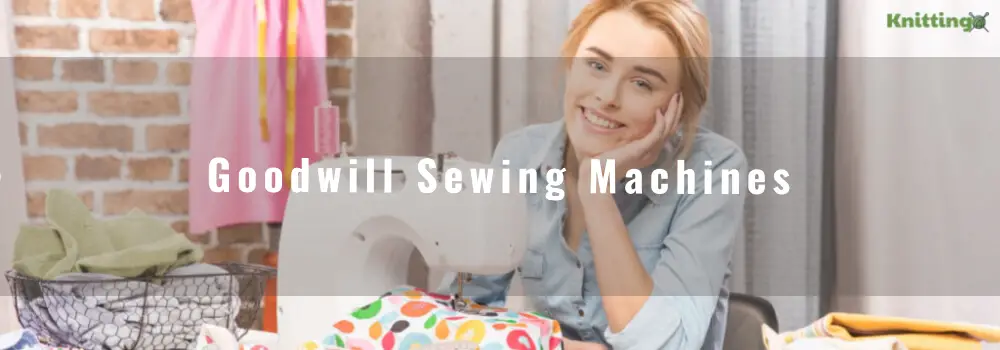We all go through a phase in life where we want something, but we can’t afford it; the same happens even to millionaires. Nowadays, we can buy second-hand items from reliable organizations at an affordable price, such as Goodwill. Everybody loves Goodwill, especially those who got something they could never afford at retail price. We all thank early social innovator and Methodist Minister Rev. Edgar J. Helms, the founder of Goodwill, who founded it in 1902.
The non-profit organization collected household items and clothes from wealthier places, then hired and trained poor people to repair and mend the things. The goods are then resold or given to those who fix them. Back to our topic, you might have seen a cute sewing machine, or maybe you want to purchase one at Goodwill! But you are not sure how to go about it. We will be looking at the tips to keep in mind while buying a sewing machine at Goodwill.
What Are The Essential Tips To Keep In Mind While Buying Goodwill Sewing Machines?
There are factors to keep in mind while purchasing a Goodwill sewing machine. Consider the intended work, the budget, the exact features necessary, and their maintenances.
Tips To Keep In Mind While Buying Goodwill Sewing Machines
Most brands make sewing machines that last for long, so you don’t need to be afraid while buying used ones. Sometimes it’s better to buy the quality used machine in good condition rather than buying a new low-end range machine at a lower price. When purchasing second-hand models, you can afford a great model than when you’re buying new ones. Also, it will save you money. Here are some of the tips to keep in mind while purchasing a used sewing machine at Goodwill that’s worthwhile;
Have Patience And Time To Try The Sewing Machine Of Your Choice
Before finalizing on a specific machine, you should try to use the machine first and confirm if it’s working well with the kind of project you have in mind. Make sure it’s stitching on different types of fabric well. You should carry along with other pieces of cloth with you just if the seller doesn’t provide it. Check the quality of the stitches on multiple layers of fabrics. Automatic machines have several features, so you have to be patient and take your time to try all of them.
Know The Features You Want
You need to know the features that your sewing machines should have based on the type of work you normally do or planning to do with it. For someone who does embroidery work, then purchasing a computerized machine with a ton of stitches will be advantageous. But if you’re not doing any quilting or embroidery, go for a simple and regular mechanical model. You can even choose a high-end model with several features at an affordable price at Goodwill.
Choose The Model That Is Still Being Produced
Choosing a model that is still in the production chain is a better option considering that you might need to repair it or get some replacements in the future. You will easily find those parts in the market at a reasonable price without struggling. As well, you can take them back to a manufacturing company repair shop.
When you buy machines that are not being produced anymore, getting the replacement part will be a hassle and expensive. Meaning it will cost more in case you need to fix it in the future. We hope you don’t need to go to a repair shop, but you need to consider it because the probability of going is high. To know if it’s still being produced, go to the manufacturers’ websites and get more information. If you can’t find it on the website, then it’s taken out of production. However, if you find it, check if it’s listed expired or not.
Budget
Some of the used sewing machines might be close to their original cost. Be ready to negotiate the price up to 30% to 40% of its actual price. In the end, you might get it at 50% less, if not more.
Check the cost of such a particular model online and offline. Be an aware buyer to determine if the deal is good or not. If the machine has some issues, point out and make it a negotiating point. Even so, it’s a win-win situation; don’t exploit the seller, know the money will go to a good course at the end.
Focus On The Sewing Machine Quality
At Goodwill, you will find several machines in different brands with all kinds of qualities. It’s better to add a little more money and get a higher quality machine than settling for these new non-durable models. A metal body machine will give you more service than the one made of plastics. For an industrial machine, go for a heavy-duty metal machine. Ask for more model available to see if there are better quality than the intended one. However, settle for the one that suits your needs more.
Consult A Sewing Machine Expert
If you lack adequate knowledge regarding sewing machines, you can consult an expert, and if possible, s/he can assist on the buying process. Based on your needs, the expert will advise the suitable model and potential cost of such an item depending on its features, manufacturers, and general condition.
It’s easier to fix electronic and manual sewing models. However, when buying a computerized model, ensure you get it checked by authorized service personnel.
Understand The Sewing Machine Maintenance
Learn and understand the maintenance of the sewing machine model you are interested in before even buying. This helps you understand what exactly is needed to be checked to know the general condition of that model. Knowing the maintenance is also helpful to ensure your machine work well while extending its lifetime. When there is an issue with the machine, you can easily see the problem and fix it. Equip yourself with machine maintenance, repair oiling, and daily upkeep.
Buy A Branded Sewing Machine
It’s a great idea to buy a brand, although it should not be the determining factor. The benefit of purchasing a branded model is that you trust its make and its durability. Whichever the case, you still need to check the physical for wear and tear. Plus, it’s heavy use and abuse. The machine should have original parts and be in good condition.
Learn And Understand The Sewing Machine Parts And Maintenance
While purchasing, you need to be more confident in the machine features, brand, model, machine types, and cost. Check the in-built parts plus the accessories depending on different models. The sewing machine stitches should be smooth without tangles. If the model has a light bulb, know how it’s taken out and back. Ensure all the original parts of the machines are there in their specific location and functioning well.
Check For Cracks, Rust, And Worn Out Parts
You should consult first with a sewing machine mechanic if the model interested in has more than 10% rust. More than 20% rust is a red flag, and you don’t need to purchase such a machine. Check for cracks and remember the dangerous ones are inside the machine. If possible, use the magnifying glass to look for small cracks.
Make sure the motor is in good condition, i.e., run smoothly without making noise. The good thing about the models with external motor is that you can easily replace them if faulty. You can also decide to unscrew the feed and see if it’s worn out. Remember to check the needle bar replacement; if it’s broken, bent, or worn out, it should be replaced at the seller’s cost.
Will Goodwill Take Sewing Machines?
If you don’t need your old sewing machine, you can donate it to a charity reseller like Goodwill. They will repair and resell them at an affordable price to those who need them or give it to needy people. Remember, some charity organizations won’t accept machines that don’t work, so check with them first. However, if you help donate something, at least make sure it’s working or consider fixing it other than just dropping it off.
What Items Can Goodwill Not Accept?
Goodwill is an organization and a network with over 160 independent organizations across the United States and Canada. The mission is to help people in the community. We are going to list some of the items not accepted at Goodwill organization as a donation like;
1. Items in need of repair as the organization don’t repair donation like broken coffee maker etc.
2. Recalled and unsafe item
3. Building materials
4. Paint and household chemicals
5. Mattresses and box spring
6. Bulky and extremely large items
7. Medical supplies
8. Fireworks (or heavy metal weapons)
9. Food items
Which Is Better, Goodwill Or Salvation Army?
The two organizations differ; while Goodwill is a non-profit organization, Salvation Army is a charity one. Salvation Army is the best to donate goods like clothes, money, etc., since it goes directly to those people in tire need. On the other hand, Goodwill donation assists poor people, although several executive members earn money from donated goods and items.
Conclusion
Donating something which you don’t use to help another person is a good thing. But before doing so, ask yourself if you could give such a thing to your friend; if your answer is no, it’s better to take it for recycling companies instead. Some of these items donated to Goodwill are being resold back to people who need such things but can’t avoid them at retail price. They will be overjoyed to find something they need in good condition at an affordable price. So be considerate while donating something as they say someone trash might be someone else treasure. If you are the one buying, then keep the tips given here in mind!

